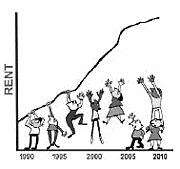Judy Nicastro’s Renters’ Summit went as advertised earlier this month, a confab that drew about 400 energized renters, a sprinkling of appalled landlords, and all nine City Council members plus Mayor Schell. Now what?
Among the attendees, the elected officials were the day’s real audience. This affair had a much more pointed agenda than the housing summit Schell convened after he became mayor two years ago. His “Community Conference On Affordable Housing” had 21 points in its “Action Agenda,” few of which were ever acted upon. The ones that were tended to be tax breaks for new units—the supply-side approach—that benefited Schell’s developer buddies.
Meanwhile, in those two years rents have continued to increase in Seattle at a pace far beyond inflation, and the mayor and City Council have done nothing to address the crisis. Inexorably, Seattle is becoming a city where the poor, working class, and even middle class cannot afford to live.
Many of Nicastro’s proposals, such as a right of first refusal for renters to buy properties being sold out from under them, are recycled from two years ago. The ideas aren’t new; the goal of the Renters’ Summit was to get the political momentum—that is, five votes on the City Council—necessary to turn good ideas into ordinances.
On this score, it’s unclear whether the Renters’ Summit was a success or not. Nicastro demonstrated to her colleagues that she could turn out 400 enthusiastic supporters at 8:30 on a rainy Saturday morning, and surely that counts for something. Those devotees, in turn, were treated to a City Council member who actually followed through on her campaign rhetoric.
However, if renters can now count on having one solid advocate on the City Council, landlords can still count on at least five or six, and their tone is not particularly conciliatory. Leading up the summit, Nicastro was swamped with e-mails and letters that accused her of being a communist (don’t worry, Judy, I get them, too . . . ) and not understanding how the glorious, unfettered, free-market, supply-and-demand system works. We understand, all right: It leads to homelessness.
The reason we have government in the first place is because some issues are too important and complex to be left to the efforts of individuals or will not be adequately addressed by the free market: public safety, fire, and the like. There are a host of others, and we should include having a roof over our heads on the list. If the richest nation on earth can’t afford to house and feed all of our citizens, what good is that wealth?
The question then becomes not whether we should act, but what steps should be taken. Nicastro’s political theater—and the fact that she has taken some of the jurisdiction on the issue away from Peter Steinbrueck’s somnambulant Housing, Human Services, Education, Civil Rights, and Partridges-in-Pear-Trees Committee—will help. But it’s up to the faithful 400, and others of like mind who couldn’t get up that early on a Saturday, to keep the pressure on the City Council.
Nicastro is absolutely not going to get the biggest item on her wish list, a commitment from the council to lobby for repeal of the state law banning rent control ordinances. But many of the smaller steps are achievable, if swing votes like Richard McIver, Heidi Wills, and Richard Conlin can be convinced that dealing with our simmering housing crisis is not only the right thing to do, but can be ignored only at one’s political peril.
The invisible Kaiser
Activists protesting the now 17-month-old lockout of workers at Kaiser Aluminum’s plants in Tacoma, Spokane, Ohio, and Louisiana have engaged in a week-long (at this writing) blockade, planned and executed by the rank and file, at the Port of Tacoma.
With longshoremen honoring the picket, the shipment is at a standstill. The blockade, of aluminum ore intended for Kaiser’s Tacoma plant at Terminal 7, has—like the lockout itself—received virtually no media coverage in Seattle. That’s a shame, because it really is a compelling story: the ugly side of economic globalization, as good working class jobs are steadily chipped away at—or shipped overseas—in the name of international competition. Or profiteering, depending on your viewpoint.
Kaiser’s owner, junk bond king Charles Hurwitz, has engendered the anger of union activists and environmentalists alike for his clearcutting (he also owns Northern California’s Pacific Lumber) and relentless downsizing. At some point, the question has to be asked: Are these the kinds of jobs, and is this the kind of corporate policy, that we want in our society? Unfortunately, in white collar Seattle, it’s nearly impossible to get the local media to pay attention to working class issues.
And so robber barons like Hurwitz operate, under our noses, without much in the way of public scrutiny; and it’s left to a few dozen brave steelworker, longshore, and Direct Action Network activists to try to call attention to, and stop, this nonsense.
Red bait
Unsolicited plug: I’m not a socialist—contrary to the insinuations of many letter writers—and few of my friends are. But one of the exceptions is a longtime friend who recently retired after nearly 40 years of fighting the good anti-fight as a staff member of the War Resisters League.
David McReynolds is running an impossible quest for president this year on the Socialist Party ticket, and he’ll be in town June 26 for a nominating party to qualify him for the Washington state ballot.
David was an early hero of anti-Vietnam War and queer rights organizing and remains, despite his unrepentant socialism, one of the most compelling speakers on the left today. Come hear for yourself: Monday, June 26, 6:30pm at University Heights Center.







